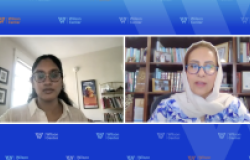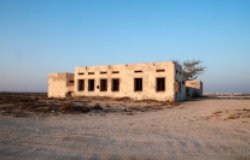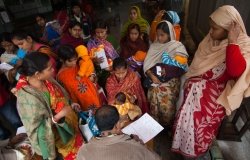Islam, Gender, and Reproductive Health: Part 1 of 6
This meeting was the first in a series of six that examines the intersection of reproductive health and gender issues in the Islamic world. This meeting provides an overview of general demographics in the region, and the perspectives of Islam on family planning and contraceptive use.
Overview
This meeting was the first in a series of six that will provide an in-depth look at the intersection of reproductive health and gender issues in the Islamic world, addressing the range of religious adherence to Islam and the impact of such diverse views on reproductive health policy and programming. This meeting provided an overview of general demographics in the region and the perspectives of Islam on family planning and contraceptive use.
Nazy Roudi provided statistical analysis of the demographics of Islamic countries. She discussed the fast fertility decline seen in the Middle East versus the slower decline in Muslim countries like Somalia, Mali, and Niger; she noted the high number of births in sub-Saharan Africa versus the lower numbers in the Middle East North Africa (MENA) region. Other statistics looked at the declining birth and death rates in the Arab world and the young median age of countries in the region, though the age remains higher than global averages. Roudi noted two consequences of large populations in the region: 1) with continued growth, fresh water resources that are currently stressed will soon be scarce. Iran and Sudan, she said, hold half of the region's resources; and, 2) young people are flooding the job markets, creating high unemployment rates.
Roudi noted that family planning is sanctioned in Islam and that contraception is not forbidden in the Koran. She discussed Iran's successful family planning programming. When the Iranian government began to prioritize family planning, it was put in the context of the country's economic and political interests. The campaign highlighted, for example, that having less children would lead to a better education, and that having two children was enough (even if both were girls). Family planning classes were required for a marriage license. Today, 73 percent of married women use contraceptives, making Iran the Muslim country with the highest contraceptive prevalence rate (CPR). Iran also encourages men to participate in family planning through elective vasectomy procedures; this, Roudi said, is not seen in other Muslim countries. Iran also has the region's only condom factory.
Barbara Ibrahim described "dignity" as a function for Muslims equivalent to the core value of freedom for Americans. This dignity might be challenged, she said, as Middle Easterners feel they are on the receiving end of modernization and globalization trends, including those related to family planning. She described the inevitable negative conclusions drawn by governments when donor countries provide funding for family planning and reproductive health programs, but do not provide resources for other desired programs such as computer training. Another problem in the region is the timing of marriage – though men are marrying at higher ages, trends for early marriage among women and girls result in shortened educational opportunities as they quit school to have children. Furthermore, many issues such as HIV/AIDS and marital rape are left to NGOs with few resources.
As for reproductive health themes in Islamic countries, Ibrahim stated homosexuality is criminalized and largely condemned in the Koran. As large cohorts of youth are not finding jobs and are having health problems, Ibrahim describes the first generation born of largely secular parents to look to faith for answers to questions of gender inequality. Public discourse regarding the regulation of marriage is failing, she said, because it is only talking about abstinence. Ibrahim notes Islam does not oppose a discourse of rights; however, Muslims feel Western ideas of "sexual freedom" have been pushed on them.
This series is sponsored by The Middle East Program and Environmental Change and Security Project at The Woodrow Wilson International Center, and is supported by USAID's Office of Population and Reproductive Health and the Interagency Gender Working Group.
Drafted by the Middle East Program.
Speakers
Hosted By

Environmental Change and Security Program
The Environmental Change and Security Program (ECSP) explores the connections between environmental change, health, and population dynamics and their links to conflict, human insecurity, and foreign policy. Read more

Middle East Program
The Wilson Center’s Middle East Program serves as a crucial resource for the policymaking community and beyond, providing analyses and research that helps inform US foreign policymaking, stimulates public debate, and expands knowledge about issues in the wider Middle East and North Africa (MENA) region. Read more

Maternal Health Initiative
Life and health are the most basic human rights, yet disparities between and within countries continue to grow. No single solution or institution can address the variety of health concerns the world faces. By leveraging, building on, and coordinating the Wilson Center’s strong regional and cross-cutting programming, the Maternal Health Initiative (MHI) promotes dialogue and understanding among practitioners, scholars, community leaders, and policymakers. Read more
Thank you for your interest in this event. Please send any feedback or questions to our Events staff.









